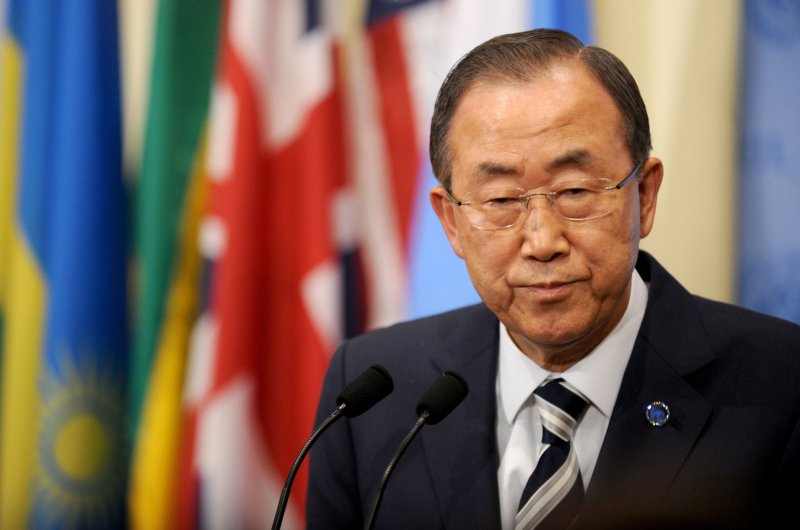United Nations Secretary-General Ban Ki-moon speaks to reporters at United Nations Headquarters following a closed UN Security Council meeting discussing a just-released UN chemical weapons inspector's report about the use of sarin gas in Syria last month at the United Nations in New York City on September 16, 2013. UPI/Dennis Van Tine |
License Photo
GENEVA, Switzerland, Feb. 17 (UPI) -- North Korea commits crimes against humanity, including "murder, enslavement, torture, imprisonment, rape, forced abortions," says a U.N. report released Monday.
The report from Geneva, Switzerland, by the U.N. Commission of Inquiry on Human Rights in the Democratic People's Republic of Korea called on the international community to act and get the International Criminal Court involved, the United Nations said in a release.
"The gravity, scale and nature of these violations reveal a state that does not have any parallel in the contemporary world," the three-person commission said in the report on its 11-month inquiry.
"These crimes against humanity entail extermination, murder, enslavement, torture, imprisonment, rape, forced abortions and other sexual violence, persecution on political, religious, racial and gender grounds, the forcible transfer of populations, the enforced disappearance of persons and the inhumane act of knowingly causing prolonged starvation," the report said.
"Crimes against humanity are ongoing in the Democratic People's Republic of Korea because the policies, institutions and patterns of impunity that lie at their heart remain in place."
The report included evidence provided by victims and witnesses, including the treatment of political prisoners, some saying they sometimes caught snakes and mice to feed malnourished babies while others told of witnessing family members being killed in prison camps.
"The fact that the Democratic People's Republic of Korea ... has for decades pursued policies involving crimes that shock the conscience of humanity raises questions about the inadequacy of the response of the international community," the report said. "The international community must accept its responsibility to protect the people of the Democratic People's Republic of Korea from crimes against humanity, because the government of the DPRK has manifestly failed to do so."
The report said North Korea, which has rejected the inquiry as a "charade," showed attributes "of a totalitarian state."
"There is an almost complete denial of the right to freedom of thought, conscience and religion, as well as of the rights to freedom of opinion, expression, information and association," the report said.
"The unspeakable atrocities that are being committed against inmates of ... political prison camps resemble the horrors of camps that totalitarian states established during the 20th century. The institutions and officials involved are not held accountable," the report said. "Impunity reigns."
The U.N. report estimated 80,000-120,000 political prisoners are detained in four political prison camps, where, it said, deliberate starvation has been used for control and punishment.
The report includes a letter summarizing the most serious findings that commissioners sent to North Korea's leader, Kim Jong Un. The letter said the commission would recommend referral of the situation in the North Korea to the International Criminal Court "to render accountable all those, including possibly yourself, who may be responsible for the crimes against humanity referred to in this letter and in the commission's report."
Longtime North Korea ally China, a permanent member of the U.N. Security Council, can exert its veto power to prevent a referral to the International Criminal Court, the Wall Street Journal reported.
"We think that it will not contribute to improving a country's human-rights situation by resorting to the International Criminal Court to address the human-rights issue," Chinese Foreign Ministry spokeswoman Hua Chunying said.
Since it was created in 2013, the commission examined satellite imagery and took evidence and testimonies from more than 100 victims, witnesses and experts on North Korea, CNN said.
Witnesses said death was common in prison camps.
"Because we saw so many people die, we became so used to it," one prison camp survivor told the commission. "I'm sorry to say that we became so used to it that we didn't feel anything. In North Korea, sometimes people on the verge of dying would ask for something to eat. Or when somebody died we would strip them naked and we would wear the clothes. Those alive have to go on, those dead, I'm sorry, but they're dead."
Another survivor of how a female prison camp inmate was forced to pick up her crying newborn baby and put its face under water until the cries stopped and a water bubble formed from the newborn's mouth, CNN reported.















